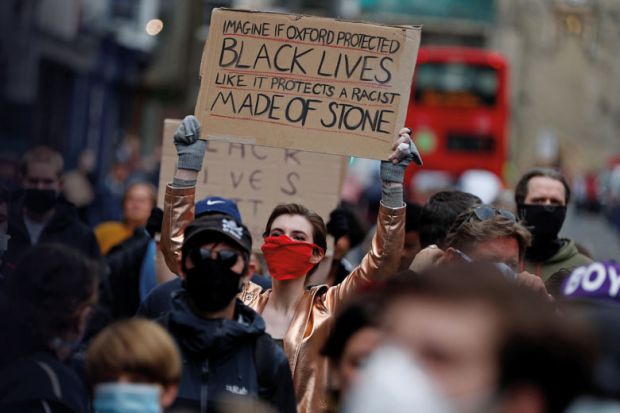Universities bear a heavier burden than the rest of society in tackling racism because they have been so complicit in it thriving, according to a university provost who said addressing the issue would take more than the current “spasm of public guilt and performative hand-wringing”.
Katherine Fleming, provost of New York University, told the Times Higher Education World Academic Summit that “the very concept of prestigious higher education for a very long time in the US rested on a concept of prestigious higher education for white Protestant Christians”.
“It was a big deal when Catholics got in on the act; it was a bigger deal when Jews got in on the act; and it still is a really big deal the idea that black people can get in on the act. And it is deeply entrenched in American society at pretty much every level,” she said.
Professor Fleming said higher education “bears a heavier burden than much of the rest of society to try and address this because it has been so complicit in it for so long in terms of its own views of what constitutes its proper consumer or its proper client”.
While she recognised that universities were trying to address the problem by hiring more diverse faculty, she said that in many ways that solution was “a cosmetic patch”.
“In a kind of vying over the prize of stellar faculty of colour, we’re going to congratulate ourselves because I managed to poach someone from Toronto, so now Toronto’s numbers go slightly down and my numbers go slightly up,” she said.
“If you take this even to the smallest of extremes, it itself becomes a distasteful and racist and fetishistic exercise.”
Professor Fleming said universities “need to be thinking at much more basic levels [about] how they engage with the societies around them”.
“What does it mean for us to be trying to diversify our student body into an institution that in many ways is making people feel that we’ve done them a favour by opening the door and then have done nothing once they get here to make them feel that they actually belong?” she said.
“What I’m intending to say here is that this is a profoundly deep problem. It certainly didn’t just emerge this year. It is the most stubbornly entrenched problem in my country, and it’s going to take a lot more than a spasm of public guilt and, in large part, performative hand-wringing to do away with it.”
Angela Owusu-Ansah, provost at Ashesi University in Ghana, said debates about the inequalities that have been exposed by the pandemic and the recent anti-racism protests would “not necessarily move the needle one way or another” in terms of addressing racism in higher education.
“I think [the pandemic] just brings more light to it, but it exists and it’s perverse and it’s deep,” she said.
However, Meric Gertler, president of the University of Toronto, said universities “have an opportunity to make serious inroads” in tackling systemic racism.
He said taking a pipeline approach to addressing diversity, such as by working closely with local schools to help them encourage more students of colour and more students from disadvantaged backgrounds to attend and thrive in university, was “very valuable”.
If universities “think about every stage in the pipeline from elementary and high school, right through to professor”, they can introduce interventions “in order to really have long-term lasting impact in tackling this issue”, he said.
Register to continue
Why register?
- Registration is free and only takes a moment
- Once registered, you can read 3 articles a month
- Sign up for our newsletter
Subscribe
Or subscribe for unlimited access to:
- Unlimited access to news, views, insights & reviews
- Digital editions
- Digital access to THE’s university and college rankings analysis
Already registered or a current subscriber? Login









